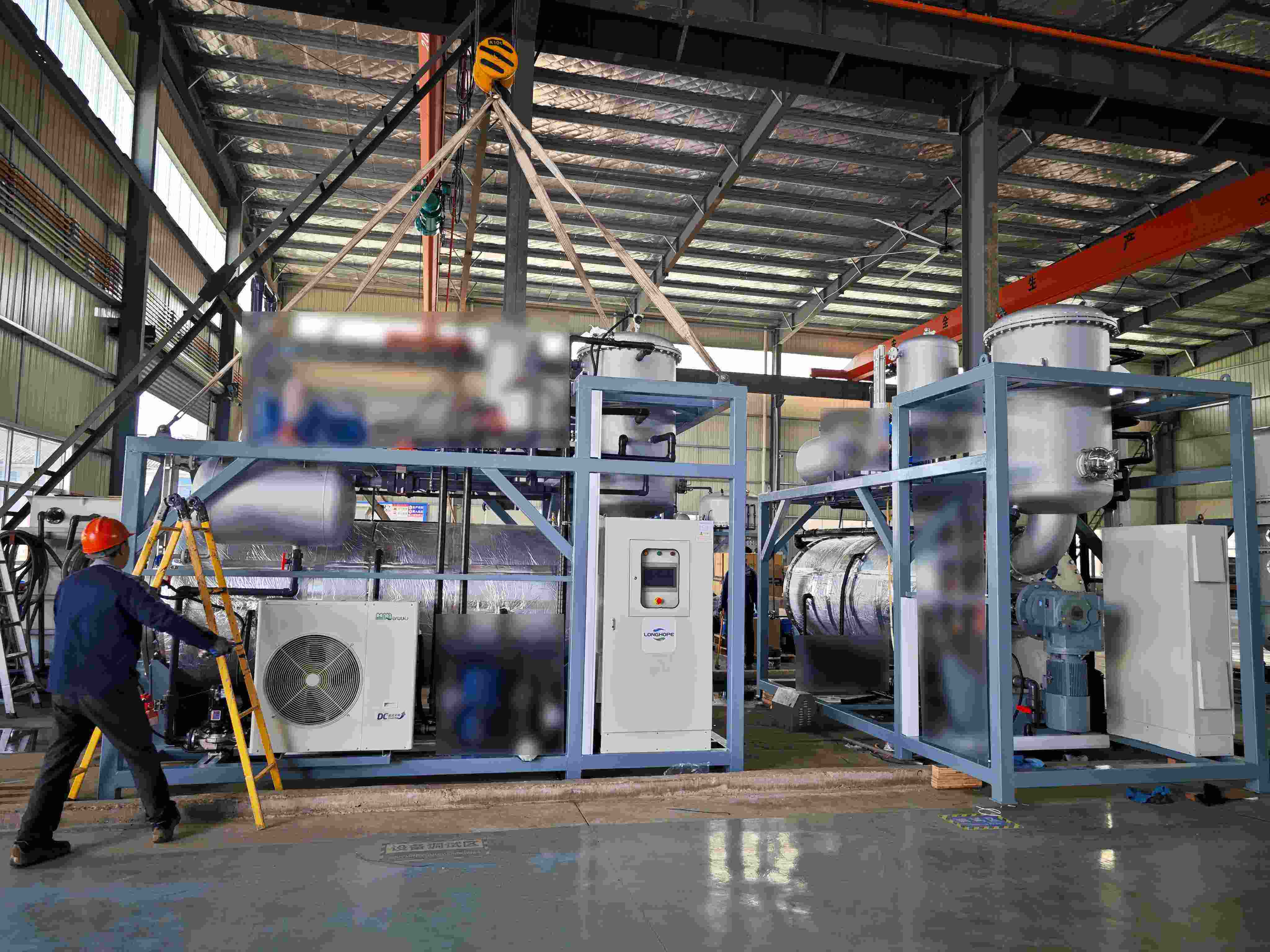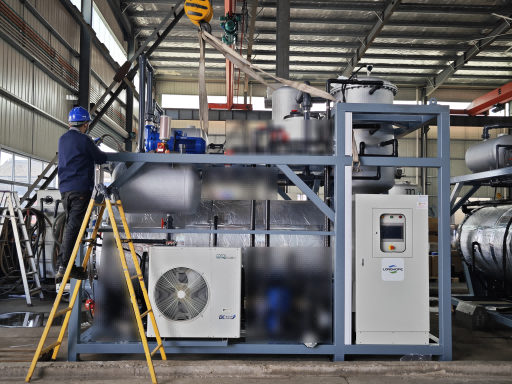Kristallizator Maşını: Sənaye Kristallizasiyasının Gələcəyi
Sənaye Kristallaşdırma ilə tanışlıq
Kristallaşma əsrlər boyu bir çox sənaye sahələrində vacib bir prosesdir. Qədim dövrlərdə duz istehsalından bu gün yüksək təmizlikdə olan dərman maddələrinin hazırlanmasına qədər kristallaşdırma materialların ayrılması və təmizlənməsi üçün etibarlı bir üsul olaraq qalır. Sənaye sahələri daha çox səmərəliliyi, davamlılığı və dəqiqliyi tələb etdikləri üçün müasir avadanlıqların inkişafı kritik bir vəziyyətə gəldi. Bu transformasiyanın ön sıralarında qabaqcıl nəzarət, ölçeklenebilirlik və rəqəmsal texnologiyalarla inteqrasiya təmin edən Kristallaşdırıcı Maşın var. Bu məqalədə Kristallizator Maşını sənaye kristallaşmasının, onun tətbiqlərinin, üstünlüklərinin, çətinliklərinin və texnoloji yeniliklərinin gələcəyini formalaşdırır.
Kristallizator maşını nədir?
A Kristallizator Maşını nəzarət olunan şəraitdə kristallaşma prosesini təşviq etmək üçün nəzərdə tutulmuş xüsusi sənaye qurğusudur. Dərili fazdan qatı kristal quruluşlara keçidini asanlaşdırmaq üçün temperatur, konsentrasiya, qarışıqlıq və təzyiq kimi dəyişənləri tənzimləyir. Bir dəfə formalaşdıqdan sonra bu kristallar sənayenin tələblərindən asılı olaraq ayrılır, toplanır və daha da işlənir. Ənənəvi kristallaşdırma üsullarından fərqli olaraq, Kristallaşdırıcı maşın avtomatlaşdırma, səmərəlilik və dəqiqliyi birləşdirir və müasir böyük miqyaslı istehsal üçün əvəzsizdir.
İş prinsipləri
Aşırı doymuşluq
Kristallaşma supertəmizlənmə ilə başlayır, burada bir həll tarazlıqda saxlaya biləcəyindən daha çox həll olunmuş maddə ehtiva edir. Kristallaşdırıcı maşın, arzuolunmaz yan məhsullara və ya qeyri-qanuni hissəciklərə səbəb olmadan kristal nüvəsini və böyüməsini təşviq etmək üçün supertəmizlənmə səviyyələrini diqqətlə idarə edir.
Nüvə və artım
Maşın nüvələşməni, kristal toxumların ilkin əmələ gəlməsini və bu toxumların daha böyük kristallara çevrilməsini idarə edir. Soyuqlaşma sürətlərini, buxarlanmanı və ya təzyiq azaldılmasını idarə edərək, Kristallaşdırıcı Maşın bənzər və proqnozlaşdırıla bilən kristal inkişafını təmin edir.
Kəsilməz və ya Partlayışlı İşləmə
Tətbiq növündən asılı olaraq, kristallaşdırma kəsilməz və ya partlayış rejimində aparıla bilər. Kəsilməz kristallaşdırma, ardıcıl keyfiyyət və daha yüksək məhsuldarlıq təmin edir, partlayış kristallaşdırma isə xüsusi və ya kiçik miqyaslı məhsullar üçün daha böyük çeviklik imkanı verir.
Sanoayi Tətbiq sahələri kristallizator Maşınlarının
Dərman sənayesi
Dərman istehsalında saf və ardıcıl keyfiyyət mütləqdir. Kristallaşdırıcı Maşınlar sıx nəzarətli hissəcik ölçüsünün paylanması ilə aktiv dərman maddələrinin (API) istehsalı üçün istifadə olunur. Bu, birbaşa dərmanın həllolma qabiliyyətini, bioloji mövcudluğunu və tənzimləyici tələblərə uyğunluğu təsir edir.

Qida və içki sənayesi
Şəkər və duz kristallaşdırılması klassik nümunələrdir, lakin müasir tətbiqlər süd zülallarına, üzvi turşulara və şirinləşdiricilərə qədər uzanır. Kristallaşdırıcı Maşın tekstur, dad və sabitlik təmin edir ki, bu da istehlakçı razılığı üçün kritikdir.
Kimya istehsalı
Kristallizator Maşınları rəngləyiciləri, gübrələri və sənaye duzlarını təmizləyərək təkrar istifadəyə hazırlayır. Bu maşınlar məhsuldarlığı artırır, ətraf mühitə təsiri azaldan səmərəli və böyük miqyaslı həllər təmin edir.
Ədəbi su təmizləməsi
Çöplük su axınlarında tez-tez həll edilmiş bərk maddələr var ki, onları çıxarmaq və ya bərpa etmək lazımdır. Kristallaşdırıcı maşınlar duzların və kimyəvi maddələrin bərpasını təmin edir, daha təmiz axın suyu istehsal edir və resursların yenidən istifadəsinə dəstək verir.
Madən və Metallurgiya
Kristallaşdırıcılar lityum, mis sulfat və elektronika, batareyalar və bərpa olunan enerji sistemlərində istifadə olunan digər duzlar kimi mineralların çıxarılması üçün vacibdir. Yüksək bərpa nisbətlərini və saflıq səviyyələrini təmin edirlər, kritik xammaldan asılı olan sənaye sahələrini dəstəkləyirlər.
Kristallizator Maşınlarının üstünlükləri
Məhsulun təmizliyinin artırılması
Proses dəyişənlərini diqqətlə tənzimləməklə, bir Kristallaşdırıcı Maşın yüksək saflıq məhsulları təqdim edir. Bu, xüsusilə də ciddi standartlara riayət edilməli olan dərman məhsullarında, incə kimyəvi maddələrdə və qida emalı sahəsində çox vacibdir.
Effektivlik və Enerji İqtisadiyyati
Destillasiya kimi alternativ ayrılma üsulları ilə müqayisədə kristallaşma tez-tez daha enerji səmərəlidir. İstilik bərpa sistemləri ilə təchiz edilmiş müasir maşınlar əməliyyat xərclərini daha da azaldır.
Mövcudlaşdırma və flexibilite
Tədqiqat və İnkişafda istifadə olunan laboratoriya miqyaslı modellərdən kütləvi sənaye birləşmələrinə qədər Kristallaşdırıcı maşınlar istehsal ehtiyaclarına uyğunlaşdırıla bilər. Onların rahatlığı müxtəlif həlllilik və temperatur xüsusiyyətlərinə malik müxtəlif birləşmələri idarə etməyə imkan verir.
Çevikləşdirici Davamlılıq
Tullantı axınlarından bərpa etməyə və xammal istifadəsini minimuma endirməyə imkan verərək Kristallizator Maşınları davamlı təcrübələri dəstəkləyir. Tullantıları qiymətli resurslara çevirərək təkrar emal iqtisadiyyatı prinsiplərinə töhfə verirlər.
Bircinslik və Keyfiyyətin Nəzarəti
Kristallizator Maşınlarında olan dəqiq nəzarət mexanizmləri məhsulun sabit keyfiyyətini təmin edir, dəyişkənliyi azaldır və istehsal seriyaları üzrə etibarlılığı artırır.
Kristallaşdırıcı maşınlarının növləri
Soyutma kristallaşdırıcıları
Bu maşınlar doymuş məhlulun temperaturunu azaldaraq kristallaşmanı təmin edir. Şəkər istehsalı, dərman sənayesi və kimya sənayesində istifadə olunur, burada nəzarətli soyutma bərabər kristalların alınmasına kömək edir.
Buxarlandırma kristallaşdırıcıları
Buxarlaşma, kristallaşma baş verməyənə qədər məhlulun konsentrasiyasını artırır. Buxarlanma kristallaşdırıcıları duzların, gübrələrin və xüsusi kimyəvi maddələrin istehsalında geniş yayılmışdır.
Vakuum kristallaşdırıcıları
Azaldılmış təzyiq altında işləyən vakuum kristallaşdırıcılar daha aşağı temperaturda kristallaşmanı təmin edir və bu da onları istiliyə həssas materiallar üçün idealdır.
Qəlpə Boru Qırağ (DTB) Kristallizatorları
DTB kristalləşdiriciləri davamlı işləmək üçün hazırlanmışdır, böyük və vahid kristal istehsal edir. Tez-tez yüksək həcmli sənaye kimyəvi istehsalı üçün istifadə olunur.
Kristallaşdırıcı maşınların tətbiqindəki çətinliklər
Yüksək Başlanğıc Investisiyası
Bir Kristallaşdırıcı maşının ilkin dəyəri, xüsusən də böyük miqyaslı sistemlər üçün əhəmiyyətli ola bilər. Qurğular effektivlik, bərpa və davamlılığın uzunmüddətli faydalarını ilkin xərclərlə diqqətlə ölçməlidirlər.
Texniki Biliyin Tələb Edilməsi
Kristallaşdırıcı maşının işləməsi kristallaşma prosesləri ilə tanış olan bacarıqlı işçiləri tələb edir. Səmərəsizlik və ya məhsul keyfiyyəti problemlərindən qaçınmaq üçün təlim və təcrübə vacibdir.
Dayanım və əməliyyat tələbləri
Avtomobilin qurğusunda qalınlaşmanın, çirklənmənin və potensial korroziyanın idarə edilməsi üçün müntəzəm təmir vacibdir. Tikinti müəssisələri etibarlı performans təmin etmək üçün profilaktik baxım cədvəllərini tətbiq etməlidir.
Kristallaşdırıcı maşın texnologiyasında gələcək meyllər
Akıllı Avtomatlaşdırma
Növbəti nəsil kristallaşdırıcı maşınlar qabaqcıl avtomatlaşdırma və süni intellektlə təchiz olunur. Bu sistemlər proses parametrlərini dinamik olaraq tənzimləmək üçün sensorlardan, real vaxt monitorinqi və proqnozlaşdırıcı analitikadan istifadə edir, bu da minimal insan müdaxiləsi ilə optimal işləməni təmin edir.
IoT ilə inteqrasiya
Sənaye İnterneti (IIoT) kristallaşdırıcıların zavodun ümumi sistemləri ilə əlaqə quraraq mərkəzləşdirilmiş idarəetmə, məlumat toplama və performansın optimallaşdırılması imkanı yaradır. Uzaqdan izləmə təmir işlərini asanlaşdırır və dayanma vaxtını azaldır.
انرژی نین دواملی انتیگریاسی
Sənaye sektorları karbon izini azaltmağa yönəldikcə, kristallaşdırıcı maşınlar bərpa olunan enerji mənbələri ilə inteqrasiya edilməsi və ya enerji bərpa effektivliyinin artırılması üçün yenidən dizayn edilir. Bu, onları daha ətrafəmənəvi cəhətdən davamlı edərək uzunmüddətli xərcləri azaldır.
Modullu və çevik dizaynlar
Gələcək kristallaşdırıcı maşınlar müəssisələrin yeni məhsullara sürətlə uyğunlaşmasına və ya əməliyyatları daha səmərəli şəkildə artırmasına imkan verən modulyar dizaynlarla təchiz olunacaq. Dəyişkən məhsul portfelinə malik sənaye sektorlarında çeviklik əsaslı amil olacaq.
Əvvəzlənmiş Materiallar və Qatqular
Corroziona davamlı materialların və antifuling təbəqələrinin inkişafı Kristallizator Maşınlarının xüsusilə ağır kimyəvi mühitlərdə daha uzun ömürlü və daha yaxşı işləməsini təmin edəcək.
Nəticə
Kristallaşdırıcı Maşın misilsiz dəqiqlik, səmərəlilik və davamlılıq təklif edən sənaye kristallaşmasının gələcəyini təmsil edir. Onun rolu əczaçılıq və qidadan kimyəvi maddələrə, tullantı sularının təmizlənməsinə və mədənçıxarmaya qədər bir çox sənaye sahələrini əhatə edir. Təmizləmə, ayırma və bərpa proseslərini optimallaşdırmaqla, daha yüksək məhsuldarlığa və ətraf mühitə cavabdehliyə aparan yol təqdim edir. Yüksək ilkin xərclər və texniki təcrübə kimi problemlər qalsa da, faydalar məhdudiyyətlərdən xeyli üstündür. Ağıllı avtomatlaşdırma, IoT inteqrasiyası və davamlı dizaynda irəliləyişlərlə Kristallaşdırıcı Maşın kimyəvi və material emalının gələcəyini formalaşdırmağa davam edəcək.
SSS
Kristallaşdırıcı maşın nə üçün istifadə olunur?
Sənayeyə dəyərli materialları təmizləməyə, ayırmağa və bərpa etməyə imkan verən kristallaşma prosesini təşviq etmək və idarə etmək üçün istifadə olunur.
Hansı sənaye sahələri kristallaşdırıcı maşınlara daha çox güvənir?
İlaç, qida emalı, kimyəvi maddələr, tullantı sularının təmizlənməsi və mədənçilik kimi sənaye sahələri bu maddələrə çox bağlıdır.
Kristallizator Maşınlarının əsas növləri hansılardır?
Soyuqlaşdırma, buxarlanma, vakuum və çəkmə boru baffle kristallaşdırıcıları ən çox yayılmış növlərdir.
Kristallizator maşını necə davamlılığı artırır?
Bu, tullantı axınlarından dəyərli materialların bərpasını təmin edir, xammal istifadəsini azaldır və döngə iqtisadiyyatı praktikasını dəstəkləyir.
Kristallaşdırıcı maşınlar enerjiyə qənaət edirmi?
Bəli, onlar tez-tez distillasiya kimi alternativ üsullardan daha enerji səmərəlidir və istilik bərpa sistemlərini əhatə edə bilər.
Kristallaşdırıcı maşınlardan istifadə etməklə hansı çətinliklər yaranır?
Yüksək ilkin investisiya, texniki təcrübə tələbləri və saxlama tələbləri əsas problemlərdir.
Kristallaşdırıcı maşınlar istiliyə həssas materialları idarə edə bilərmi?
Bəli, vakuum kristalləşdiricilər xüsusi olaraq yüksək temperaturda parçalanan birləşmələr üçün hazırlanmışdır.
Kristallaşdırıcı maşınlar məhsulun keyfiyyətini necə təmin edir?
Nüvələşmə, böyümə və superdolulaşma şərtlərini tənzimləyirlər, vahid ölçülü və yüksək saflıqlı kristallar istehsal edirlər.
Hansı texnoloji meyllər kristallaşdırıcı maşınların gələcəyini formalaşdırır?
Ağıllı avtomatlaşdırma, İOTI inteqrasiyası, bərpa olunan enerji ilə uyğunluq, modul dizaynı və qabaqcıl materiallar əsas meyllərdir.
Kristallaşdırıcı maşınlar sənayenin gələcəyi üçün niyə vacibdir?
Onlar səmərəliliyi, davamlılığı və dəqiqliyi təmin edir, bu da onları daha yüksək məhsuldarlıq və ətraf mühitə məsuliyyət göstərməyə çalışan sənaye sahələri üçün vacib edir.
Mündəricat
- Kristallizator Maşını: Sənaye Kristallizasiyasının Gələcəyi
- Sənaye Kristallaşdırma ilə tanışlıq
- Kristallizator maşını nədir?
- İş prinsipləri
- Sanoayi Tətbiq sahələri kristallizator Maşınlarının
- Kristallizator Maşınlarının üstünlükləri
- Kristallaşdırıcı maşınlarının növləri
- Kristallaşdırıcı maşınların tətbiqindəki çətinliklər
- Kristallaşdırıcı maşın texnologiyasında gələcək meyllər
- Nəticə
-
SSS
- Kristallaşdırıcı maşın nə üçün istifadə olunur?
- Hansı sənaye sahələri kristallaşdırıcı maşınlara daha çox güvənir?
- Kristallizator Maşınlarının əsas növləri hansılardır?
- Kristallizator maşını necə davamlılığı artırır?
- Kristallaşdırıcı maşınlar enerjiyə qənaət edirmi?
- Kristallaşdırıcı maşınlardan istifadə etməklə hansı çətinliklər yaranır?
- Kristallaşdırıcı maşınlar istiliyə həssas materialları idarə edə bilərmi?
- Kristallaşdırıcı maşınlar məhsulun keyfiyyətini necə təmin edir?
- Hansı texnoloji meyllər kristallaşdırıcı maşınların gələcəyini formalaşdırır?
- Kristallaşdırıcı maşınlar sənayenin gələcəyi üçün niyə vacibdir?

